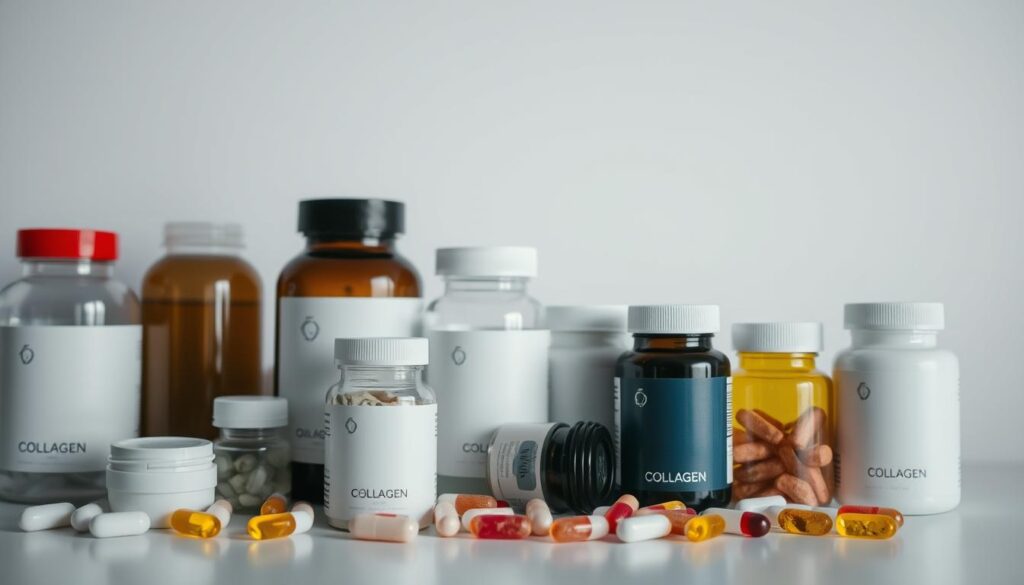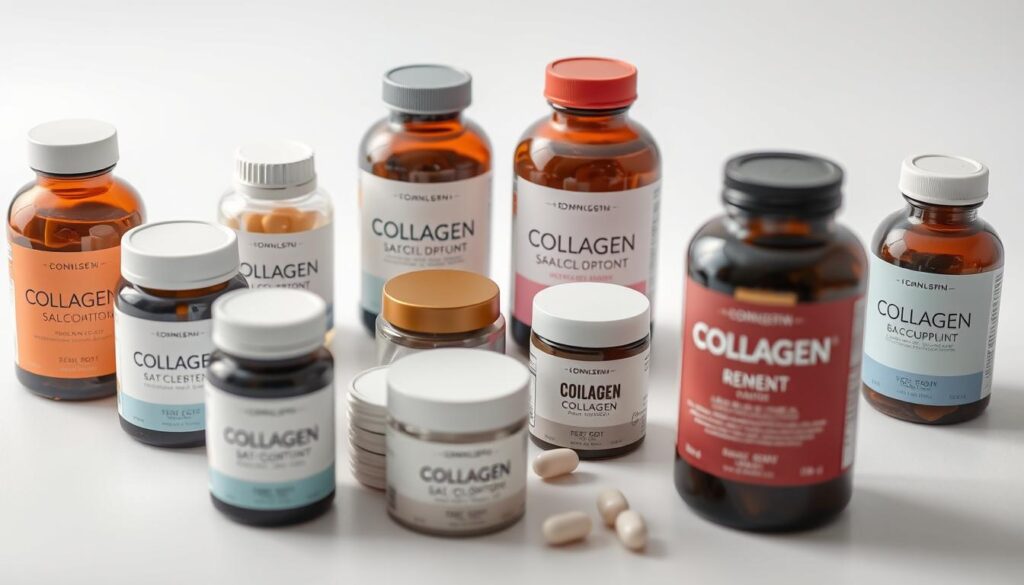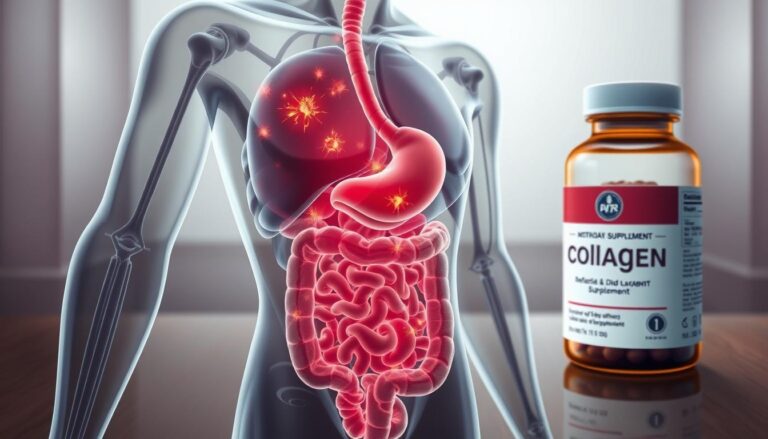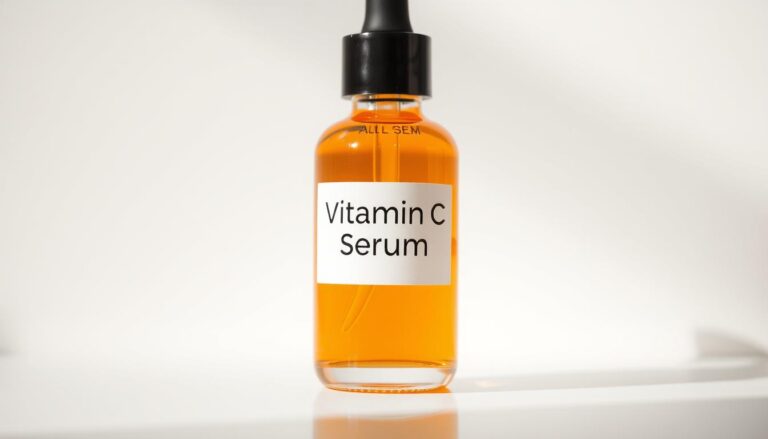Can you take collagen while pregnant ?
As an expectant mother, you’re probably worried about staying healthy and keeping your baby safe. Collagen is a protein that helps make up your skin, bones, muscles, and tendons. It’s key to your body’s structure and how it works.
When you’re pregnant, your body changes a lot. Collagen for skin health becomes even more important. You might be thinking, is it okay to take collagen supplements? Knowing how collagen during pregnancy works can help you make better choices for your health.
Table of Contents
Understanding Collagen and Its Role in the Body
As you go through pregnancy, knowing about collagen is key. Collagen is a protein that gives structure, strength, and flexibility to tissues like skin, bones, and tendons.
What Is Collagen and Why Is It Important?
Collagen is the most common protein in us, making up 25% to 35% of all proteins. It’s vital for keeping skin, hair, nails, and connective tissue healthy. There are types of collagen, like Type I and Type II, each with its own role. For example, Type I helps skin stay strong, and Type II is good for joints.
Natural Collagen Production During Pregnancy
Pregnancy changes your body a lot, affecting collagen production. Estrogen levels rise, which can increase collagen and help skin stay elastic. But, the body’s demand for collagen also grows to support the fetus and the mother’s changes. Knowing how collagen changes during pregnancy can guide your choices about supplements.
| Collagen Type | Primary Location | Function |
|---|---|---|
| Type I | Skin, Bones, Tendons | Skin strength, bone density |
| Type II | Cartilage | Joint health, cartilage integrity |
| Type III | Blood vessels, Muscles | Vascular integrity, muscle support |
Can You Take Collagen While Pregnant?
When you’re pregnant, you might wonder if collagen supplements are safe. There’s a lot of interest in their safety and benefits during this time.
Current Research on Collagen Supplementation During Pregnancy
Research on collagen during pregnancy is still growing. But, studies say it’s usually safe. The collagen dosage is important, ranging from 2.5 to 15 grams daily.
Even though there aren’t many studies on collagen and pregnancy, collagen supplement reviews show it’s safe for most people. This might also apply to pregnant women, but with caution.
Some research points to collagen’s benefits for skin and joints. These are important during pregnancy due to the body’s changes. But, we need more studies to be sure about collagen’s safety and effectiveness during pregnancy.
What Medical Professionals Say About Collagen During Pregnancy
Doctors usually tell pregnant women to be careful with supplements, including collagen. They say collagen is likely safe but we need more research. It’s very important for pregnant women to talk to their healthcare provider before taking collagen.
Doctors recommend a healthy diet and lifestyle for pregnant women. If you’re thinking about collagen, look for products with clear labels and third-party tests. When reading collagen supplement reviews, make sure they come from trusted sources.
Potential Benefits of Collagen During Pregnancy
Collagen supplements offer many benefits during pregnancy. They can improve skin elasticity and support joints. As pregnancy advances, the body changes, affecting skin, joints, and health. Collagen may help ease these changes.
Support for Skin Elasticity and Stretch Marks
Collagen supplements can help with skin elasticity. Pregnancy stretches the skin, leading to stretch marks. Collagen for skin health is key as it keeps skin elastic, possibly reducing stretch marks. More studies are needed, but many women report better skin resilience with collagen.
Joint and Ligament Support
Collagen is great for joint and ligament health. Pregnancy strains joints due to weight gain and posture changes. The benefits of collagen supplements include supporting joints and ligaments, easing discomfort and pain.
“Collagen supplements have been shown to improve joint health by supporting the integrity of cartilage and reducing inflammation.”
Protein Supplementation for Fetal Development
Collagen is a protein-rich food, vital for fetal growth. Pregnancy boosts protein needs for the fetus. Though not a complete protein, collagen adds to protein intake, aiding fetal health and development.
| Benefit | Description |
|---|---|
| Skin Elasticity | Collagen supports skin health, potentially reducing stretch marks. |
| Joint Support | Collagen helps maintain joint and ligament health, alleviating pregnancy-related discomfort. |
| Protein Supplementation | Collagen contributes to the overall protein intake, supporting fetal development. |
Safety Concerns and Considerations
Thinking about taking collagen while pregnant? It’s key to know the possible risks. Collagen is usually safe, but the quality and purity of supplements can vary.
Potential Risks of Collagen Supplements During Pregnancy
There’s not much research on collagen use in pregnancy. This means there are risks to think about. One big worry is where the collagen comes from. Some supplements use animal sources, which could be risky if not processed right.
Also, collagen products might have heavy metals or other harmful stuff. It’s important to pick a trusted brand that checks its products well.
- Make sure the product is safe for pregnant women.
- Look for third-party testing and certification.
- Be careful of products making big claims without proof.
Quality and Purity Concerns
Collagen supplements vary a lot in quality and purity. When picking a collagen, read collagen supplement reviews and choose products tested by others.
To get a good product, consider these tips:
- Check the ingredients for allergens or contaminants.
- Check if the manufacturer’s claims are true.
- Choose products that are open about their sources and making process.
Going for a best collagen product that’s clear about its ingredients and making can lower some risks in pregnancy.
Different Types of Collagen Supplements
Exploring collagen supplements reveals a variety of types and sources. Not all collagen supplements are the same. Knowing the differences is key when choosing during pregnancy.
Types of Collagen
Types of Collagen (I, II, III, V, and X)
There are many types of collagen, each with its own role in our bodies. The most common types are:
- Type I: Found in skin, tendons, and bones, supporting skin elasticity and strength.
- Type II: Primarily located in cartilage, providing joint support.
- Type III: Supports blood vessels and muscles.
- Type V: Found in hair, placenta, and certain layers of skin.
- Type X: Associated with the growth plate cartilage.
Knowing these types helps you pick the right supplement for your needs during pregnancy.
Marine Collagen vs. Bovine Collagen During Pregnancy
Collagen supplements come from marine and bovine sources. Marine collagen, from fish, is highly bioavailable and rich in Type I collagen. Bovine collagen, from cows, is a mix of Type I and III collagen. Marine collagen might be more sustainable and less likely to have contaminants.
Collagen Peptides vs. Whole Collagen
Collagen supplements come in two forms: collagen peptides and whole collagen. Collagen peptides are smaller, making them easier for the body to absorb. Whole collagen is still beneficial but might not be as easily absorbed. Your choice depends on your preference and digestive system.
When picking a collagen supplement, think about the type, source, and form that fits your pregnancy needs. Always talk to a healthcare provider to find the best option for you.
Consulting with Healthcare Providers
Talking to your healthcare provider is key to knowing if collagen supplements are safe for you while pregnant. They can give advice tailored to your health, pregnancy status, and any risks of collagen use.
Questions to Ask Your Doctor About Collagen
When you talk to your healthcare provider about collagen supplements, ask the right questions. You might want to ask:
- Is collagen supplementation safe during my stage of pregnancy?
- Are there any potential interactions between collagen supplements and my current medications?
- Can collagen help with joint health or skin elasticity during pregnancy?
- What are the potential benefits and risks of taking collagen supplements while pregnant?
These questions can help you understand how collagen might affect your pregnancy.

Trimester-Specific Considerations
Each trimester of pregnancy has its own considerations for collagen use. For example, the first trimester focuses on the baby’s growth. The third trimester might focus more on joint health and skin.
First Trimester: Be careful with supplements during this time. Talk to your healthcare provider about the risks and benefits of collagen.
Third Trimester: If you’re thinking about collagen for joint health or stretch marks, look at reviews and talk to your doctor about what’s best.
“The key to safely using collagen supplements during pregnancy is thorough consultation with healthcare professionals and careful consideration of the potential benefits and risks.”
Natural Sources of Collagen During Pregnancy
Keeping collagen levels healthy is key for skin and overall health during pregnancy. It’s good to look at natural collagen sources too. They can help support your health during this time.
Collagen-Rich Foods to Include in Your Pregnancy Diet
Eating foods rich in collagen can help your body make more collagen. Bone broth, chicken, and fish are good choices. Also, eating Vitamin C-rich foods like citrus fruits and berries can boost collagen production.
For more on collagen supplements during pregnancy, check out Absolute Collagen’s blog.
Foods That Support Natural Collagen Production
There are foods that help your body make more collagen. Nuts and seeds with copper and zinc are great. Also, foods with omega-3 fatty acids like salmon are good for collagen health.
Adding these foods to your diet can help your body’s collagen needs. It might even cut down on the need for supplements. This supports your health during pregnancy.
How to Choose Pregnancy-Safe Collagen Products
Choosing a safe collagen product for pregnancy needs careful thought. There are many options, so pick ones that are both safe and effective.
What to Look for in Collagen Supplements
Look for collagen supplements from high-quality sources. Make sure they have been tested for purity and safety. Third-party certifications can help you know if a product meets standards. Also, think about the type of collagen, as different types have different benefits.
| Collagen Type | Benefits | Sources |
|---|---|---|
| Type I | Skin, hair, and nail health | Bovine, marine |
| Type II | Joint health | Chicken, bovine |
| Type III | Circulatory health | Bovine |
Red Flags and Ingredients to Avoid
Watch out for products with unsubstantiated claims. Also, avoid those that don’t clearly list their ingredients and how they’re made. Stay away from artificial additives and fillers. Always check for allergens and potential irritants.

By doing your research and being careful, you can find a collagen supplement that’s safe and helpful during pregnancy.
Alternatives to Collagen Supplements During Pregnancy
There are many alternatives to collagen supplements for skin and joint health during pregnancy. If you’re looking for other options, you’re not alone. Many expectant mothers try different supplements and lifestyle changes to stay healthy.
Other Pregnancy-Safe Supplements for Skin and Joint Health
Besides collagen, other supplements can help with skin and joint health. Omega-3 fatty acids are known for their anti-inflammatory effects. You can find them in fish oil, walnuts, and chia seeds. Vitamin C is also important for collagen production and can be found in citrus fruits and leafy greens. Hyaluronic acid supplements can also keep your skin hydrated and elastic.
Lifestyle Factors That Support Collagen Production
Lifestyle changes can also support collagen production and overall health during pregnancy. Eating a balanced diet with fruits, vegetables, and lean proteins is key. Drinking plenty of water helps keep your skin hydrated and supple. Gentle exercises like yoga or walking can also help your joints and overall health. For more information on safe practices during pregnancy, you can visit this resource.
Conclusion: Making an Informed Decision About Collagen During Pregnancy
When you’re pregnant, knowing about collagen supplements is key. They can help keep you healthy. But, it’s important to think about the good and bad sides before choosing.
Collagen might help your skin and joints feel better. Yet, it’s vital to check if the supplements are safe for you. Talking to your doctor and picking safe collagen products is a smart move.
Looking into natural collagen sources and other health options is also good. This way, you can choose what’s best for you and your baby. Staying informed helps you make choices that support your health during pregnancy.






